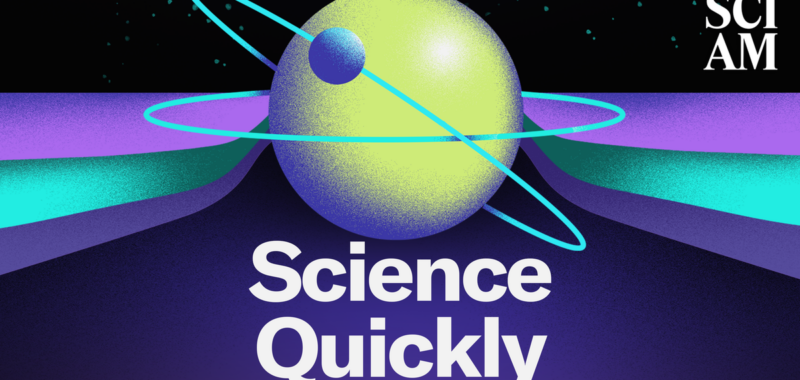American Lifespans, Monkeys That Yodel, Measles, and More
States sue HHS for public health cuts, measles cases continue to rise, and a study finds Americans live shorter lives compared with their European counterparts.

Anaissa Ruiz Tejada/Scientific American
Rachel Feltman: Happy Monday, listeners! And happy April. For Scientific American’s Science Quickly, I’m Rachel Feltman. Let’s kick off the week with a quick roundup of science news you might have missed.
To start we have some public health updates. Last Friday the Texas health department reported that there have been 481 known measles cases since late January, up from 400 on March 28. Texas Public Radio recently reported that several children with measles have also needed treatment for toxic levels of vitamin A. As I explained in the March 10 news roundup episode, U.S. Health and Human Services Secretary Robert F. Kennedy Jr. has publicly touted vitamin A supplementation for measles patients while seemingly downplaying the importance of vaccines. According to a recent report by ProPublica, U.S. Centers for Disease Control and Prevention leaders blocked the release of an assessment on the ongoing outbreak written by the agency’s own experts. The planned messaging around the assessment reportedly would have emphasized the need for vaccinations to prevent measles. In a statement to ProPublica, a CDC spokesperson claimed that this report was not published “because it does not say anything that the public doesn’t already know” and that the CDC still presents vaccines as “the best way to protect against measles.” But the spokesperson went on to add that “the decision to vaccinate is a personal one,” saying folks “should be informed about the potential risks and benefits associated with vaccines.”
Now the good news is that we know a lot about the risks associated with the measles vaccine, and they’re extremely low. For instance, one study used the mass vaccination of 14.3 million kids in China from September 2007 to March 2008 to track the rate of serious adverse events. The researchers saw a rate of just over two such events for every million vaccine doses given. In contrast, one in every 1,000 cases of measles is associated with encephalitis, or swelling of the brain, which can be deadly. And several major studies have found no link between the measles-mumps-rubella vaccine and autism diagnoses.
On supporting science journalism
If you’re enjoying this article, consider supporting our award-winning journalism by subscribing. By purchasing a subscription you are helping to ensure the future of impactful stories about the discoveries and ideas shaping our world today.
The CDC’s stifling of this new measles report isn’t the only indication that the current administration is downplaying the importance of vaccines. Late last month top U.S. Food and Drug Administration vaccine official Peter Marks resigned from his position. According to the Wall Street Journal and New York Times, Marks was given the choice between quitting and being fired.
Meanwhile, lawmakers from 23 states and Washington, D.C., are suing HHS for slashing more than $11 billion in funding for public health initiatives. We actually mentioned those cuts in last week’s news roundup. They mainly target funds that were allocated to local and state health departments during the peak of the COVID pandemic. According to the lawsuit, which was filed last Tuesday, that money was never earmarked as being solely for pandemic-response initiatives like COVID testing. Some of the funding has been directed toward strengthening public health infrastructure to make states and communities more resilient to pandemics and other major crises, including measles outbreaks, the spread of bird flu and the ongoing opioid epidemic, according to the lawmakers. Last week, NBC News reported that the Dallas County Health and Human Services Department had to cancel dozens of planned free measles vaccination clinics due to these same funding cuts.
Speaking of health in the U.S., a new study suggests that folks in America live shorter lives than their economic counterparts in Europe. In a study published last Wednesday in the New England Journal of Medicine, researchers compared data from more than 73,000 adults aged 50 to 85. The scientists found, unsurprisingly, that in any given country, people with more money tended to live longer. But the researchers also found that the wealthiest U.S. subjects had shorter lifespans, on average, than the richest participants from Europe. And in parts of western Europe such as Germany, France and the Netherlands some of the poorest residents had lifespans in line with the wealthiest Americans. The study authors say this is a reminder that systemic issues in the U.S. such as stress, diet and environmental contaminants aren’t something you can spend your way out of.
Okay, let’s pivot to lighter news. Remember that killer asteroid we were all worried about for a minute? Wouldn’t you rather talk about killer asteroids? I know I would.
The good news is that observations made with the James Webb Space Telescope have confirmed that 2024 YR4 functionally has zero chance of hitting Earth in 2032. Yay! The bad news is that there’s still a nonzero possibility that our moon will take the hit instead—about a 2 percent chance, to be exact.
And it turns out that a moon collision might not be bad news at all. Several astronomers told New Scientist that such an event would represent a huge opportunity for research. One even said he had his fingers crossed. We know the moon is pelted with smaller asteroids all the time, and its iconically pocked surface tells us it’s taken on bigger bruisers in the past. Knowing in advance that something was going to collide with the moon—and having the time to be certain of its dimensions and trajectory—would enable unprecedented study of the formation of lunar craters. That could help us understand the moon’s past.
We’ll wrap up with a fun animal story. Because you’ve earned it!
When you think of yodeling you probably imagine people in the Alps wearing wooden shoes or maybe Julie Andrews in The Sound of Music. But a study published last Thursday throws a dark horse into the competition for world’s best yodeler: monkeys.
Researchers were interested in structures called vocal membranes, which apes and monkeys have in their throats but humans no longer do. Using CT scans of several species of monkey, along with computer simulations and fieldwork, researchers found that these structures help monkeys accomplish so-called voice breaks, where they quickly switch between using their vocal membranes and vocal folds to produce sound. The result is that quick change in frequency we hear when humans yodel or make that quintessential Tarzan yelp.
Here’s an example from the tufted capuchin.
[CLIP: A tufted capuchin vocalizes.]
Feltman: That might not sound very yodel-y, but things get clearer when you slow the call down.
[CLIP: The tufted capuchin’s vocalization is slowed down.]
Feltman: Previous research has suggested that humans gave up these membranes to make our speech more stable. But I guess that might have come at the cost of some sick yodelling skills.
That’s all for this week’s science news roundup. We’ll be back on Wednesday.
Science Quickly is produced by me, Rachel Feltman, along with Fonda Mwangi, Kelso Harper, Naeem Amarsy and Jeff DelViscio. This episode was edited by Alex Sugiura. Shayna Posses and Aaron Shattuck fact-check our show. Our theme music was composed by Dominic Smith. Subscribe to Scientific American for more up-to-date and in-depth science news.
For Scientific American, this is Rachel Feltman. Have a great week!

